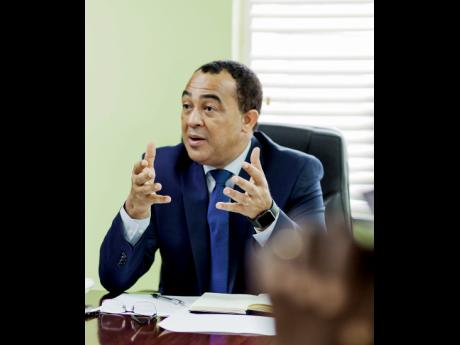Health + Tech | Telemedicine introduction in state facilities a good move on the surface
I have always been a proponent of telemedicine and its immense benefits to the healthcare system. It is a great way for rural communities to gain access to high quality health care.
I, therefore, welcomed the recent announcement from Minister of Health Dr Christopher Tufton that his ministry would be introducing telemedicine to two health facilities - May Pen Hospital in Clarendon and Kitson Town Health Centre in St Catherine, where a pilot has started in conjunction with the University Hospital of the West Indies (UHWI), which has almost completed implementation of its Hospital Information Management System (HIMS).
The impression was given that the approach was a simple video call to link doctor and patient. I fear, therefore, that we may not be including all the components to ensure that full telemedicine benefits are achieved within the wider health sphere.
We often mistake telemedicine for the ability to communicate via video. Videoconferencing is commonplace and many packages exist to make it efficient. Although that ability adds efficiency to the system, the gold standard is if that information can be captured and easily integrated to the patients' electronic medical records (EMR).
This feature would also help in informing the National Health Information System (NHIS) when the time comes for that to be in full use.
Many doctors are now requesting electronic systems that have an EMR. The Government will need the buy-in of the doctors to construct a comprehensive and holistic NHIS to include a national EMR.
MEETING OBJECTIVE
However, the important thing now is to ensure that systems are compatible in terms of overall objective and the ability to retrieve and store the data in the right way.
The information received would assist with predictive and curative analytics, which are essential to the development of the country's, and the individual's healthcare objectives.
Whatever new efficiency features are being introduced - although nobody wants the perfect to be the enemy of the good as a standard marker, there must be a credible plan to put information into a national EMR in the interest of patients.
In health, we have coordinated international codes and from these a lot of other adjunct aids are developed to achieve best practises by feeding in a diagnosis, for example, and having access to an international database.
If the telemedicine approach is just providing efficiency of access with no real contribution to health data and history then it would be only marginally better than a simple phone call. It is advisable to take the approach that would result in a consistent and universal national patient record database.
HIGHLY BENEFICIAL
The UHWI has already developed a formula for EMR which could be used across the board. Since it is the largest hospital in the island, the ability to communicate with other public and private facilitates would be highly beneficial.
A cohesive national database is useful for creating individual and family health pathways, preventive care, healthcare planning and response for the country and research. The system should allow for when a patient turns up at any facility, one comprehensive medical record representing his/her complete health history can be accessed to provide the best care possible.
My cousin, who has lung and heart issues, could have benefited from such a system. Over time, his medicine caused him to develop diabetes. He is taking multiple drugs for each issue, delicately balanced to not cause a problem with each other.
While his doctor was off the island another doctor turned up the dose on one of his medications and in just a few hours he started experiencing complications. Access to a complete database of his prescriptions, and medical history via EMR and telemedicine access to his original physician, would have prevented this.
While a full digitisation of facilities and telemedicine adoption will not happen tomorrow, we have to plan ahead and put the requisite systems in place to ensure that we do not have to take several steps back when we decide to fully implement. When adopting telemedicine, therefore, capture and storage of information and the consequential doctors' notes have to be considered.
In another article, I will speak to insurance claims and telemedicine as well as paying for the service, given that less the 15 per cent of Jamaicans have credit cards.
- Doug Halsall is the chairman and CEO of Advanced Integrated Systems. Feedback: Doug.halsall@gmail.com


